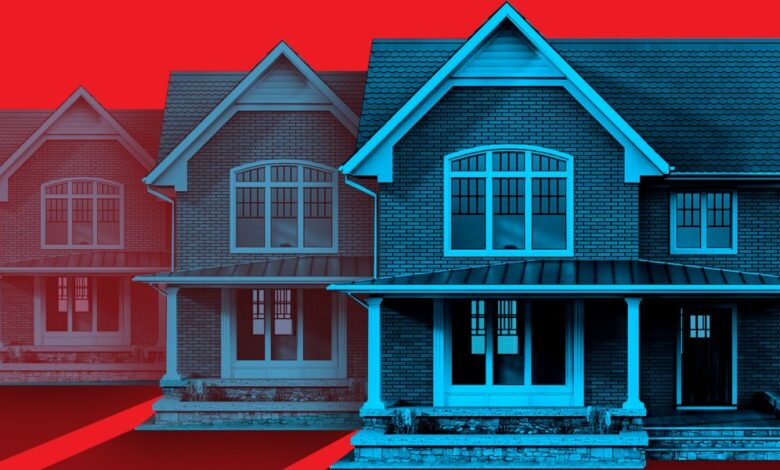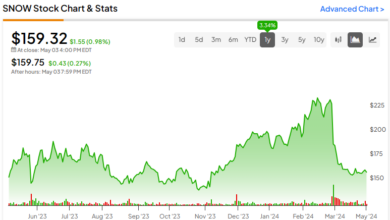November election is increasingly all about the housing market


A rematch between President Joe Biden and former President Donald Trump is all but guaranteed following their dominant performances on Super Tuesday and the incumbent’s fiery State of the Union address. And of course, economic concerns are almost always top of mind for voters in an election year. That hasn’t changed, but the economy is increasingly a one-subject issue. James Carville, a strategist for President Bill Clinton’s victorious 1992 campaign, famously explained why his underdog candidate overturned 12 years of Republican dominance: “It’s the economy, stupid.” Well, it’s looking like the 2024 election is the housing market, stupid.
More than half of homeowners and renters say housing affordability is influencing who they plan to vote for in the upcoming presidential election, according to a Redfin-commissioned survey of roughly 3,000 people, conducted last month. When asked to indicate how much they agree or disagree with the following statement: Housing affordability is affecting who I am likely to vote for in the next presidential election, 17.9% said they completely agree, and 35.3% said they somewhat agree. The widespread disaffection of Americans with the economy has puzzled economists with so much evidence that it’s doing well on paper—a “vibecession” rather than a recession. But people’s displeasure and President Biden’s poor approval ratings make sense when you consider how people are either locked in their houses or locked out of the market altogether.
Almost two-thirds of homeowners and renters say housing affordability makes them feel negatively about the economy—with 22.7% of respondents saying they completely agree with the statement: Housing affordability makes me feel negative about the economy overall, and 41.5% saying they somewhat agree.
“Housing affordability is top of mind for voters because elevated mortgage rates and home prices, along with an acute housing shortage, have pushed the dream of homeownership out of reach for many Americans,” Redfin’s chief economist, Daryl Fairweather, said. “While the economy is strong on paper, a lot of families aren’t feeling the benefits, because they’re struggling to afford the house they want or already live in. As a result, many feel stuck, unable to make their desired moves and life upgrades.”
Just consider the past several years. The pandemic-fueled housing boom pushed home prices and rents up substantially, and shortly afterward, inflation reached a four-decade high. The Federal Reserve raised interest rates in response, and mortgage rates surged. The average 30-year fixed mortgage rate hit 8% last year, a far cry from the pandemic filled historic lows. And home prices didn’t really fall since there’s so little supply. But the economy has supposedly recovered, or simply remained resilient; inflation has fallen, and interest rate cuts seem to be in store for this year. While that is all true, housing doesn’t feel like it’s recovered, even if there are healing signs. Apart from those who feel stuck in their current homes with lower mortgage rates, there are others who are just completely priced out and feel as though they’ll be renters forever.
“Those that own homes right now have seen that their wealth has gone up because their home prices, and just their assets, have gone up, and they have a fixed payment,” Zonda’s chief economist, Ali Wolf, previously told Fortune. But “converting from renting to owning feels nearly impossible,” Wolf said, “not only because supply is tight, but also because affordability is so bad right now.”
Peak home price appreciation might be behind us, but home prices are still high, and mortgage rates are higher than what younger generations are used to; would-be homebuyers need to make almost $50,000 more than they did pre-pandemic to afford to buy a home. Not to mention, we’re missing anywhere between 2 million and 7 million homes, by one estimate—which is something that will persist beyond the short-term challenges prevalent in the current housing market.
So which presidential candidate will fix, or at least attempt to fix, the problem? James B. Lockhart III, a senior fellow at the Bipartisan Policy Center who played a pivotal role as a regulator during the 2008 global financial collapse, previously told Fortune that Biden and Trump both haven’t done much for housing.
Last week, President Biden announced a plan to lower the cost of housing through tax credits (for first-time homebuyers and people selling their starter homes), down payment assistance, and more. But a top official in his administration told Fortune that the key to making housing affordable is to build more homes, which Biden’s plan mentions, without truly detailing how he plans to do so, aside from allocating funds.
“In order to be able to afford to buy homes, we need more homes in general,” Adewale Adeyemo, deputy secretary of the Treasury, told Fortune after President Biden’s State of the Union address. “We have a supply challenge in the economy,” Adeyemo explained. “Since the financial crisis, we’ve built too little housing here in the United States.”
Adeyemo isn’t the only top official who knows exactly how bad the housing crisis is. Fed Chair Jerome Powell recently attested to as much, telling Congress that “the housing market is in a very challenging situation right now.” Chiming almost exactly with Adeyemo’s diagnosis, Powell explained that even once the problems associated with high mortgage rates abate as interest rates normalize, “we’ll still be left with a housing market nationally, where there is a housing shortage.”
Source link




